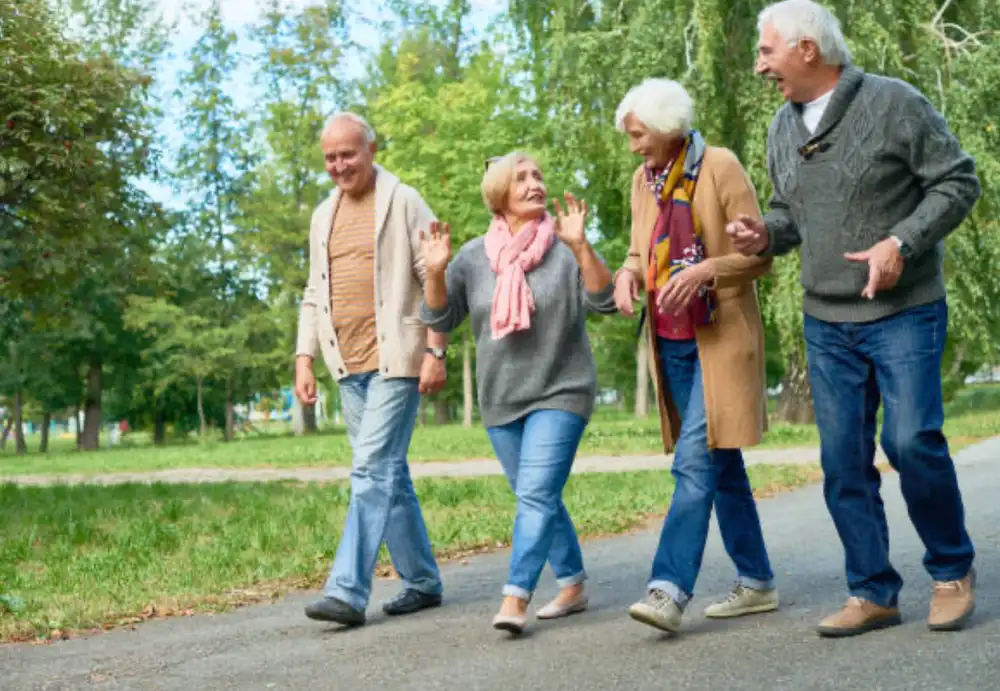
Walking Improves Health
At Be On The Move in South Florida, we understand the paramount importance of maintaining physical activity, particularly as we age. Walking improves seniors' health, quality of life, and enjoyment.
II. Benefits of Walking for Elderly
Walking is a low-impact, adaptable exercise that seniors can seamlessly incorporate into their lifestyles. Its benefits are multifaceted:
Cardiovascular Health: Walking fortifies the heart, improving circulation, aiding in cholesterol level reduction, thereby mitigating risks associated with cardiovascular diseases.
Respiratory Function: Regular walking sessions enhance lung capacity and efficiency, critical for maintaining optimal oxygen levels in the bloodstream.
Walking helps improve mental health by releasing endorphins, elevating mood, and reducing symptoms of depression and anxiety.
Weight Management: This exercise aids in caloric expenditure, vital for maintaining healthy body weight and muscle tone, supporting metabolic functions.
Walking regularly improves joint flexibility, reduces stiffness, and helps prevent injuries from falls or sudden movements, especially for people with arthritis.
III. Senior Exercise Routines: Walking as a Foundation
Developing Consistency: Establishing a daily or weekly routine is crucial. Consistency in walking schedules fosters habit development, making it easier for seniors to maintain this beneficial practice.
Routine Variation: Incorporate variations in walking routines, alternating between brisk walks, leisurely strolls, or even trying out Nordic walking. Variation introduces different intensity levels, preventing monotony and keeping the practice engaging and enjoyable.
IV. Walking and Aging Process
Regular walking improves physical appearance by enhancing posture, muscle tone, and skin health. It boosts circulation, resulting in a more youthful and vibrant look.
Walking strengthens the lower body, improving mobility and allowing people to do daily tasks without help, promoting independence.
V. Cardiovascular Health for Seniors:
The Role of Walking
Walking is a cardio-protective exercise. It aids in maintaining optimal blood pressure levels, reducing the risk of hypertension—a prevalent condition among seniors. Furthermore, it supports the management of cholesterol levels, safeguarding against atherosclerosis and subsequent cardiovascular complications.
VI. Walking for Mental Health:
A Pillar for Senior Well-Being
Walking helps memory and thinking, protecting against diseases like Alzheimer's by activating certain parts of the brain. The mental clarity gained from regular walking is invaluable, providing seniors with enhanced focus and concentration in daily tasks.
VII. Senior Weight Management:
Walking as a Key Component
Caloric Expenditure: Walking for at least 30 minutes daily contributes significantly to the caloric expenditure required for weight management. Walking is important for seniors who want to manage their weight or maintain their current weight.
VIII. Joint Health in Elderly:
Improvements Through Walking
Do gentle walking exercises to keep your joints healthy and flexible. Seniors with joint issues should talk to healthcare experts to create a walking plan that fits their health needs.
IX. Elderly Fall Prevention:
Strengthening Through Walking
Balance and Coordination: Regular walking improves neuromuscular coordination, enhancing balance and stability, which are crucial for preventing falls. Practicing walking on different terrains can also aid in developing better balance and coordination skills.
X. Senior Walking Guidelines:
Crafting a Sustainable Routine
Developing a sustainable walking routine involves listening to your body’s signals, starting slow, and gradually increasing walking duration and intensity. Consistency in walking routines is crucial for accruing long-term health benefits.
XI. Nordic Walking for Seniors:
A Case Study
Nordic walking involves using poles, providing seniors with stability while engaging upper body muscles, offering a full-body workout. This practice is particularly beneficial for seniors looking for low-impact, yet effective exercise routines to improve overall health and endurance.
XII. Conclusion
Walking every day can greatly improve the lives of older adults, providing various health benefits for both their bodies and minds. At Be On The Move, we urge seniors to walk regularly for better health and a better life.
XIII. Call to Action
Start your walking journey today with Be On The Move. Share your experiences, challenges, and successes with our community. Together, let’s stride towards a healthier, more active, and fulfilling life in our golden years.
Frequently Asked Questions (FAQs)
Q1: How much walking is recommended for seniors daily?
Recommended steps for healthy seniors: 7,000 to 10,000 per day, equaling 3 to 5 miles. Start walking slowly, then increase duration and intensity. Listen to your body and make sure you feel comfortable.
Q2: Is walking suitable for individuals with joint pain or arthritis?
Answer: Yes, walking is a low-impact exercise that can actually improve joint health and reduce pain. However, it’s crucial for individuals with arthritis or joint pain to start slowly and possibly consult with a healthcare provider or a physical therapist for personalized advice and guidelines.
Q3: Can walking improve mental health in seniors?
Yes! Walking releases endorphins in your brain, improving mood and reducing depression and anxiety.
Q4: What type of shoes are recommended for walking?
Answer: It's essential to wear comfortable, supportive shoes that fit well. Shoes should have good arch support, a slightly elevated heel, and plenty of room for your toes. Athletic or walking shoes that provide cushion and support are ideal.
Q5: What if I haven’t been active and want to start walking?
Answer: If you’re new to exercise or haven’t been active for a while, it’s important to start slowly. Begin with short walking sessions of about 5 to 10 minutes and gradually increase your time as you feel comfortable. Consistency is key, so try to incorporate walking into your daily routine.
Q6: How does walking aid in weight management for elderly individuals?
Answer: Walking helps in burning calories and building muscle, aiding in maintaining a healthy body weight. Regular walking also boosts your metabolism, assisting in the efficient burning of calories even when you’re not exercising.
Q7: Is it safe for seniors to walk alone?
Answer: Safety should be a top priority. Choose well-lit, populated areas for walking, and consider carrying a mobile phone for emergencies. If you have balance issues or other health concerns, consider walking with a partner or joining a walking group.
Q8: Can walking improve bone density in seniors?
Answer: Walking is a weight-bearing exercise, which means it can help improve bone density and reduce the risk of osteoporosis and fractures.
Q9: Should I consult a doctor before starting a walking routine?
Walking is safe for people of all ages. However, doctors recommend consulting a doctor before starting a new exercise routine. This is especially important if you have health problems.
Q10: Does Be On The Move offer walking programs or groups for seniors?
Be On The Move dedicates itself to promoting an active lifestyle for seniors. We provide various resources and support to help you start and maintain your walking routine. For specific programs and offerings, please contact us directly.
See you soon,//❤️ Trudy//Disclaimer: The information provided in this blog post is for educational purposes only and is not intended as medical advice.
Every individual's situation is unique, and the content may not apply to your specific circumstances.
Always consult with your healthcare provider for personalized advice before starting any new exercise or treatment plan.
Be On The Move encourages all readers to maintain regular appointments with their doctors and to discuss any questions they may have about their conditions or any other health concerns.
Walking Benefits for the Elderly
by Trudy Diraj on 2023-10-09
Experience top-quality in-home care
Book a Visit
Be On The Move
In-Home Physical Therapy
Be On The Move is the leading provider of in-home physical therapy in Florida. We proudly deliver exceptional care to hundreds of patients, helping them regain mobility and independence in the comfort of their own homes.

Trudy D
PT
Trudy D is a highly skilled physical therapist with extensive clinical experience in outpatient orthopedic and neurological disorders. Her comprehensive background underscores her deep clinical knowledge and commitment to exceptional patient care.

